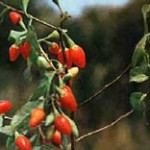
-
With the price of Goji berries going through the roof, I'm ready to plant my own bushes and grow them myself. I guess the secret is out on the benefits of this tiny, tart berry. It has only taken 30 years since modern day researchers discovered this marvelous little Chinese herb that has been used for centuries.
Here is a list of benefits based on modern research and Traditional Chinese Medicine.
-
Improve brain function
-
Reduces fatigue
-
Has liver protector qualities
-
Enhances vision
-
Energy booster and Immunity booster
-
Increase libido
-
Reduces symptoms of diabetes
-
Reduces menopause night sweats
-
Over 60 studies show goji support healthy heart function
-
Goji have been combined with cancer drugs to reverse cancer growth
One of the largest scientific studies on lycium fruit, (latin name) reported that eating 50 grams (slightly less than 2 ounces) of Goji Berry caused an increase in the white blood cell count. There was also an increase of 75 % in antibody immunoglobin A (IgA).
We added a large dose of goji berry to our Menopause Relief Herb Pac. It helped improved the taste while helping with night sweats. Although it may have some benefit as a natural sleep aid, it has more proven benefit of helping to reduce menopausal night sweats.
Goji berry also reduces DNA damage and protect DNA in animal studies. This is great news for anyone who concerned about aging. Goji berry also protects your liver.
The berries contain a compound called cerebrosides ks and is better at protecting the liver than milk thistle.
Goji berry’s polysaccharides protect testicular cells against damage from free radicals.
Goji berry also protect against Alzheimer’s disease by protecting the neurons in the brain against beta amyloid protein. This deadly protein is associated with Alzheimer’s. This is welcome news since Alzheimer’s is expected to reach epidemic levels in aging baby boomers.
Another study showed the Goji polysaccharides increase the production of interleukin-2. This protein protects against cancer and bacteria.
Goji berry may reduce insulin resistance. Diabetic animals fed Goji berries for three weeks show reduced weight and improved triglyceride, cholesterol and insulin levels.
In conclusion, Goji berry is immune-enhancing, cytoprotective and anti-tumor, a true win-win-win combination.
We now have two excellent Goji berriers products, capsules and granule powder. Our granules can be easily added to a shake or sprinkled on food or dissolved in warm water to drink as a tea. I like to place a little on my tongue and savor the flavor. Our granules/powder are highly concentrated and one bottle will last at least a month. Capsules are easy to take and convenient. You can find them both in our store, here.
References:
- Tian M and Wang M, Studies on extraction, isolation, and composition of Lycium barbarum polysaccharides, Journal of Traditional Chinese Herb Drugs, 2006 31(19): 1603–1607
- Yong Peng, et.al., Quantification of zeaxanthin dipalmitate and total carotenoids in Lycium fruits, 2006 Plant Foods for Human Nutrition, 60(4): 161–164
- Trieschmann M, et.al., Changes in macular pigment optical density and serum concentrations of its constituent carotenoids following supplemental lutein and zeaxanthin, Experimental Eye Research 2007; 84(4): 718–728
- Rosenthal JM, et.al., Dose-ranging study of lutein supplementation in persons aged 60 years or older, Investigative Ophthalmology and Visual Science 2006; 47(12): 5227–5233
- Wang Qiang, et.al., Determination of polysaccharide contents in Fructus Lycii, Chinese Traditional and Herbal Drugs 1991; 22(2): 67–68
- Yu MS, et.al., Characterization of the effects of anti-aging medicine Fructus lycii on beta-amyloid peptide neurotoxicity, International Journal of Molecular Medicine 2007; 20(2): 261–268
- Qian JY, Liu D, and Huang AG, The efficiency of flavonoids in polar extracts of Lycium chinense Mill fruits as free radical scavenger, Food Chemistry 2004; 87(2): 283–288
- Cheng CY, et.al., Fasting plasma zeaxanthin response to Fructus barbarum in a food-based human supplementation trial, British Journal of Nutrition 2005; 93(1): 123–130
- Chang RC and So KF, Use of Anti-aging Herbal Medicine, Lycium barbarum, Against Aging- associated Diseases, Cellular and Molecular Neurobiology 2007


Comments are closed.